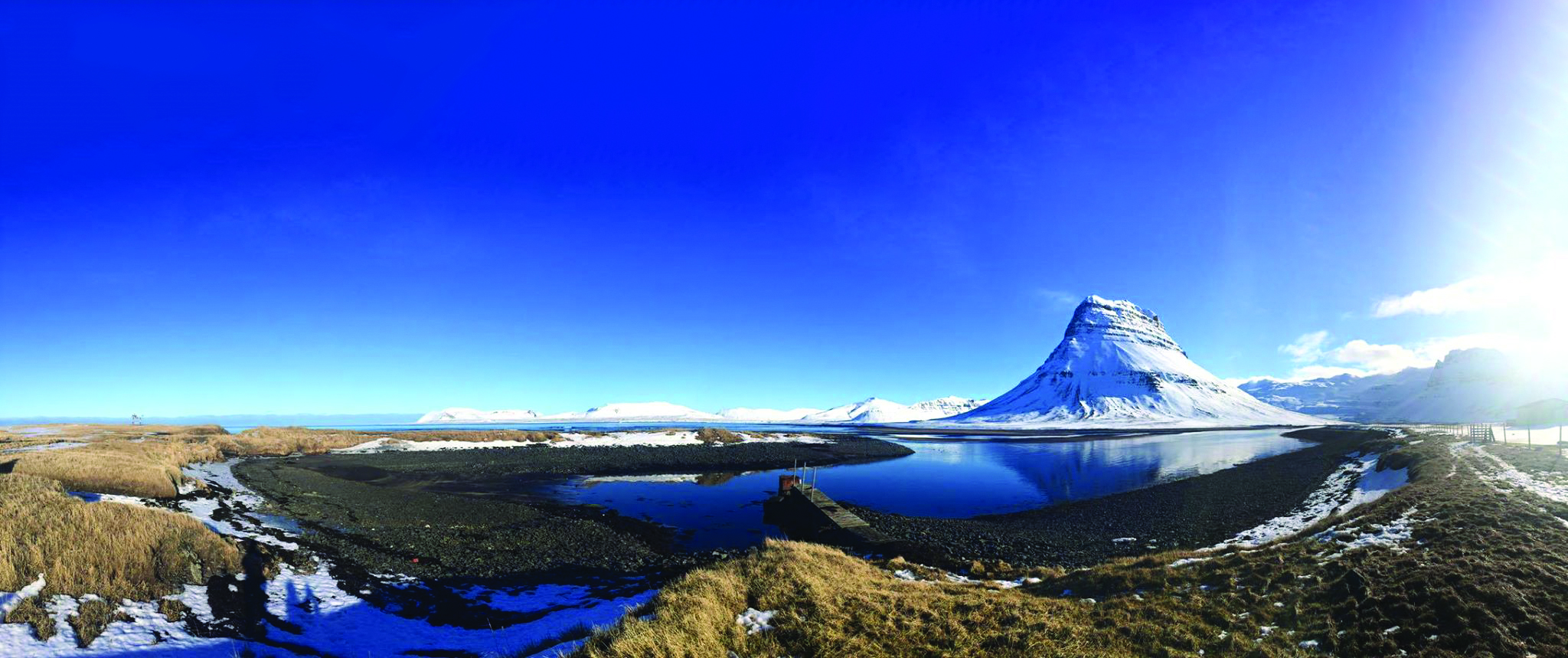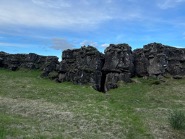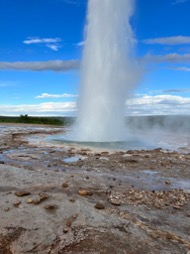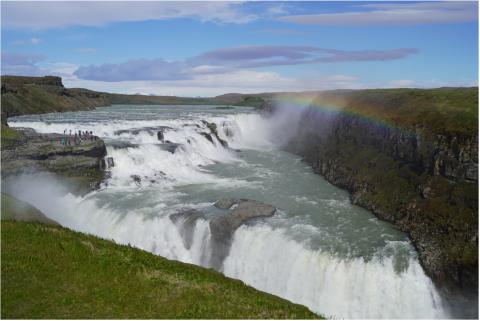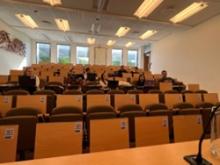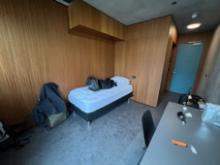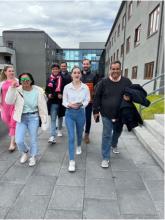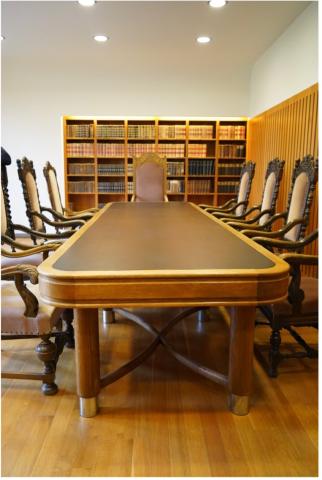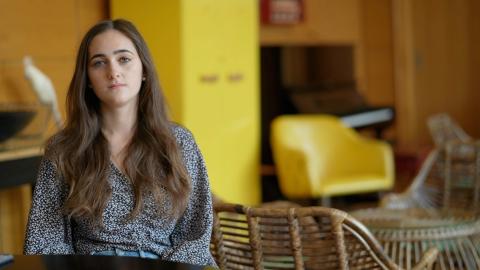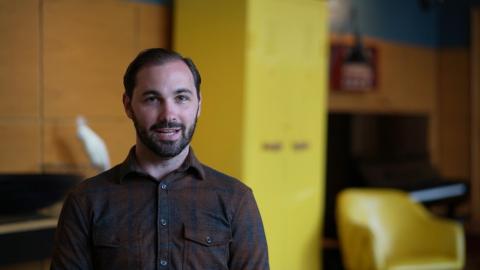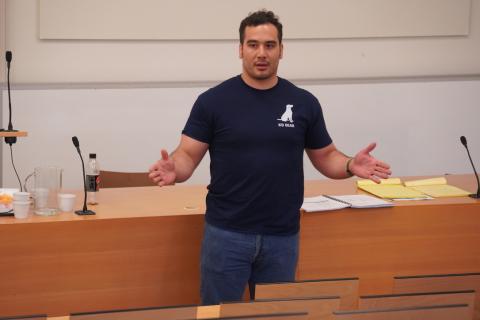The Reykjavik, Iceland study abroad program offers law students the chance to earn three credit hours while honing their advocacy skills under the guidance of a distinguished faculty from U.S. and international law schools. Students will engage with Icelandic legal professionals and collaborate with Icelandic law students in this unique cross-cultural experience.
Beyond academics, participants will explore iconic sites such as The Golden Circle, including Thingvellir National Park, Gullfoss Waterfall, and the Geysir Geothermal Area, as well as landmarks like the Blue Lagoon and Hallgrímskirkja Church. Limited to 40 students, this program offers a prestigious opportunity to prepare for global legal advocacy while experiencing Iceland’s rich culture and stunning landscapes.
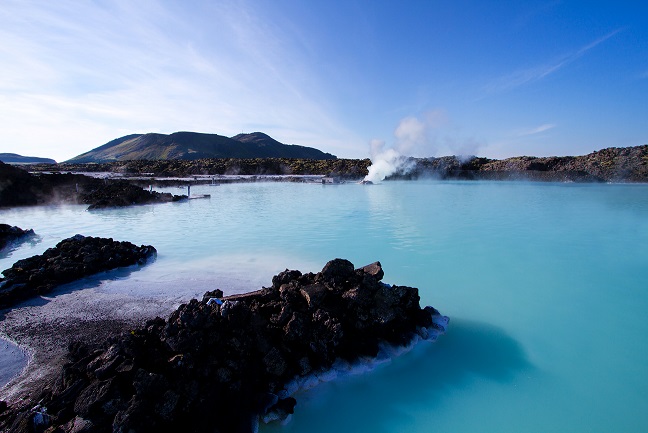
Why Visit Reykjavik, Iceland?
Spend two weeks studying law abroad next summer in Reykjavik, Iceland – the land of fire and ice. Iceland is the only place in the world where you can jump into the Blue Lagoon, hike along imposing white glaciers, and stand where Vikings once stood more than 1,000 years ago, with volcanoes in the background.Come and experience everything Iceland has to offer. You’ll work hard; learning from some of the world’s leading trial advocacy professors, while having the opportunity to take in all the fun this Nordic island nation has to offer – from the stunning scenery to the abundance of local festivals. And do we even need to mention the long summer days? All this adds up to the perfect backdrop for studies! Join us this summer and learn for yourself why Iceland continues to earn top spots on “best of” destination lists from leading publications like National Geographic’s Traveler Magazine. Reserve your spot now before they are all gone!
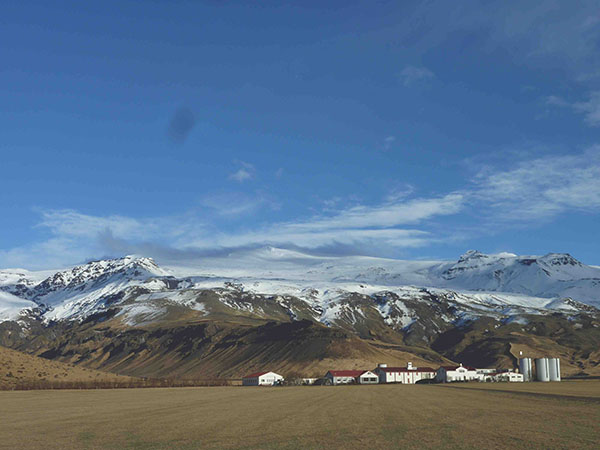
Eligibility - Reykjavik, Iceland
The Reykjavik, Iceland, study abroad program is open to law students interested in studying abroad in Iceland. Law students should have an active interest in comparative advocacy in order to make the most of this exciting academic experience. Enrollment will be limited to forty (40) students.Foreign Law Students are Welcome to Participate:
Law students from foreign law schools are also eligible and invited to enroll in the program. We have set aside 16 slots for Icelandic Law students to attend and expect to have somewhere between 6-16 students in the course for the University of Iceland.
Applicants with Special Needs:
Applicants with disabilities or other special needs should contact lawdean@onu.edu in advance to discuss arrangements. Reykjavik is a very old city that does not meet U.S. standards for accommodations. However, ONU will make every effort to reasonably accommodate the special needs of applicants.
Application - Reykjavik, Iceland
-
Iceland Study Abroad Application
Enrollment is limited to forty (40) students, and applicants will be considered in the order of receipt of application and deposit(s). The application form and a $500 non-refundable deposit must be received by ONU Law no later than March 15, 2026. The deposit will be applied toward trip expenses if the applicant is accepted and will be refunded if the applicant is denied.
IMPORTANT: Your application is NOT complete until the non-refundable tuition deposit has been paid. We cannot reserve a spot for you before this payment has been received. (The link to deposit is located in the application confirmation, or you can click here.)
-
You will need to send a certified copy of your law school transcript to ONU Law, c/o Dean's Office, 525 S. Main St., Ada, OH, 45810-6000. These will be required for credit transfer.
Transient Student Status:
Once accepted into the program you will need to apply to become a temporary or transient student at Ohio Northern University.The ONU Transient Application can be found here:
https://www.onu.edu/admissions-aid/apply-onu Click on "Re-Entry/Visiting/Transient Application" Tab
Course Registration:
Once accepted, register for the Iceland course through ONU to receive academic credit for participation. -
The costs for the 2026 program are as follows:
- Initial deposit: $500
- Tuition: $4,230 ($1,410 per credit hour)
- Housing: $2,835 (single room)
- Fees: $400
- Internet: $100
- Total Cost: $8,065 (excludes airfare and travel insurance)
-
If you will be applying for financial aid, please contact your home school's financial aid office to request a Consortium Agreement. Consortium agreements should be scanned and emailed to lawdean@onu.edu. If you are an ONU Law student applying for financial aid for this program, please complete the Financial Aid For International Study/Domestic Internships form and return it to lawdean@onu.edu.
This agreement allows financial aid to be processed while studying abroad.
-
It is the policy of Ohio Northern University not to discriminate on the basis of race, color, sex, gender identity, transgender status, religion, national origin, age, disability, sexual orientation, marital status, military or veteran status, genetic information, or any other category protected by federal, state, or local law in its educational programs, admissions policies, employment policies, financial aid, or other school administered programs.
-
The Golden Circle is Iceland's most popular sightseeing trail. Our itinerary is an easy and efficient way to see three of Iceland's top attractions in a day. Each stop offers insight into Iceland's geologic history, not to mention excellent photo opportunities.
The Golden Circle consists of three equally stunning locations in Southwest Iceland:
Thingvellir National Park is a unique site in Iceland that is both historically significant and a geological wonder. It is the first national park established in Iceland. It's also the only one that has been granted UNESCO World Heritage Site status. We will stop here in part to discuss the creation of the oldest continuous parliament in the world.
Here visitors discover the roots of Iceland’s formation and how the Icelandic settlers created their leaderless society in the late 800s.
The Geysir Geothermal Area
The second stop on the Golden Circle is the Geysir Geothermal Area, located within the Haukadalur valley. The geothermal activity is intense. Visitors can see the steam rising from miles away. Many hot pools, clay pots, and fumaroles dot the area. Minerals vividly color the hills and soil. It would be a fascinating enough site without the two geysers that make it famous.
The first of these is the one that gave all others their name: the Great Geysir. Geysir is the earliest documented geyser in European literature. Geysir rarely erupts, but its neighbor, Strokkur geyser, goes off every ten minutes, throwing water from 66 to 132 feet (20 to 40 meters) into the air.
The original Geysir is primarily inactive these days because of local tectonic activity and intrusive human intervention. Studies show that it has existed for about 10,000 years and tends to erupt in cycles. Usually, an earthquake will trigger it, and it will then slowly peter out over time.
The reliability of the highly active Strokkur in such an accessible location is part of what makes the Golden Circle so incredible.
Walking around the Geysir Geothermal Area is a fascinating and rewarding experience, but its appeal goes further than these exploding hot springs.
Gullfoss Waterfall
The third and final stop on the route of the Golden Circle is one of the most spectacular waterfalls in Iceland: Gullfoss. This is the landmark from which the Golden Circle draws its name, as Gullfoss directly translates to "Golden Falls”. Visitors can find the waterfall less than ten minutes down the road from Geysir.
This powerful waterfall is located in a plunging, ancient valley and tumbles down two drops from an overall height of 105 feet (32 meters). During its heaviest flow in the summer, it pours an average of 4,944 cubic feet (140 cubic meters) of water every second.
Gullfoss is not only known for its breathtaking power but also for the rainbows that appear above the falls like a multicolor crown on a sunny day. These only add to an already beautiful sight. In addition to the dramatic valley and falls, the area looks over rolling fields right up to the magnificent ice sheet of Langjokull glacier.
Summer is arguably the best season to visit Gullfoss. When there's no ice on the ground, a walkway takes you right up to the edge of the falls, close enough to feel the waterfall's mist on your face. The photo opportunities here are incredible, and one could spend hours marveling over the awe-inspiring power of the water.
-
Our courses take place on the campus of the University of Iceland. You will eat your meals in either your dorm room or in the local cafe, a popular spot for students and professors. The campus is self-contained, with the National History Museum of Iceland located right next door to our housing. Our course work will be done in buildings on the campus, just a short walk from our housing. We have large meeting rooms for lectures and smaller rooms for performances Vending machines can be found nearby, and like everywhere else in Iceland, credit cards work in them as well.
Each room consists of a desk, bed, and shower. The common room has an outstanding kitchen set up, communal dining area, and communal seating area. It is a great way to end the day with classmates that have quickly become friends. Downtown Reykjavik is a five minute walk away, and the sun shines 23 hours a day during the summer. It is a landscape and experience like no other.
-
History
According to legend, Iceland's first settler, Ingólfur Arnarson, threw his high seat pillars into the sea upon first arriving at the island's shores in 870 AD and promised the gods to settle where they eventually drifted ashore. It took Ingólfur and his men four years to locate the pillars and the following summer, they built their farmstead in the place he named Reykjavík, the Bay of Smoke. It will only take you about 5 minutes to make it to the city center from your dorm room.
Attractions
The center of town is a buzzy area known for the striking Harpa concert hall, and Reykjavik Art Museum, with its modern sculptures. Quaint shops cluster around Ingólfur Square, and nearby Kolaportið flea market sells books, vinyl, and antiques. Dining options span Icelandic eateries serving area-sourced fish and BBQ dishes, plus the iconic Bæjarins Beztu Pylsur hot dog stand. Lively pubs, cocktail bars, and clubs dot the area.
The Laugavegur shopping street is where it all begins. Connecting seamlessly with its sister streets Bankastræti and Austurstræti, this route is a pathway of local culture that every visitor to Iceland has to walk at least once; dotted with a myriad of shops, restaurants, galleries, cafés, bars and homes, Laugavegur serves as the very artery of the capital. These establishments are often found in the same building. This means that a single house can host a restaurant that turns into a club come nightfall, while the upper levels might be residential apartments.
-
Our host institution, the University of Iceland, has been gracious enough to arrange a visit to the Icelandic Supreme Court. Our visit last year was fascinating, with a private presentation and tour conducted by the chief justice!
The Supreme Court of Iceland was founded under Act No. 22/1919 and held its first session on 16 February 1920. The Court holds the highest judicial power in Iceland, where the court system has three levels. The Court was housed at first in the Old Penitentiary Building on Skólavördustígur in Reykjavík, but from 1949 it resided in the former court building on Lindargata.
The Minister of Justice dug the first spade of ground for the new Courthouse of the Supreme Court of Iceland at Arnarhóll on 15 July 1994, laid the cornerstone of the building on the Court’s 75th anniversary, 16 February 1995, and handed it over to the Court for use on 5 September 1996. The architects of the Courthouse are Margrét Hardardóttir and Steve Christer of Studio Grandi, Reykjavík. Their design won the first prize in a competition held in 1993 for a new Supreme Court building, where the selection committee received 40 entries.
Since 1 January 1999, the Supreme Court of Iceland has maintained a home page on the Internet. Diverse information is published there about the Court and its tasks. The judgments of the Supreme Court are published on the home page as soon as they have been pronounced, together with the judgments which were subject to review. The judgments are published free of charge for the primary purpose of making them available to attorneys and to the public, as becomes the needs of a democratic state.
The Supreme Court of Iceland is the final court of appeal in the judiciary of Iceland. It is also the oldest of the current courts of law in Iceland and the highest of the three Icelandic court branches, the others being the District Courts of Iceland and the Court of Appeal (Landsréttur).
Notwithstanding the Court not being mentioned by name in the Constitution of Iceland, but only its justices, it is validated in the Courts Act No. 50/2016. The Supreme Court of Iceland is located at the Dómhúsið (Courthouse) at Arnarhóll in Reykjavík, a building that was specially built for that purpose and that came into use in 1996.
The court was founded under the Supreme Court Act of 1919 and held its first session on 16 February 1920. Previously, the National High Court had been the highest domestic court, but a line of appeal had been available to the Supreme Court of Denmark in Copenhagen. The establishment of the Supreme Court moved the final word in Icelandic cases home to Iceland.
The first justices of the Supreme Court were Kristján Jónsson (President), Halldór Daníelsson, Eggert Briem, Lárus H. Bjarnason and Páll Einarsson. The first three men had been the judges of the old National High Court, which had operated throughout the 19th century but was abolished with the founding of the Supreme Court
-
Tara
“Iceland has been a great opportunity. I definitely think I’ve grown. I feel I have become more confident…can speak to any type of person…can take critiques well now and I think that is something that has helped me push forward. You are in a country that you may never get the chance to go to again. You will learn a lot, and meet people you would never have had the opportunity to meet. While it is a lot of work, and it can be incredibly stressful, it teaches you how to handle stress. It’s a great opportunity to advance who you are as a person.”
Caleb
“Iceland was a magical place. I wanted a chance to push my boundaries. I wasn’t sure what to expect. It was hard work but very rewarding. What was most rewarding was to meet one-on-one with professors and work in smaller groups…and to get that personalized feedback was very valuable.”
“You get out of it what you put into it. So, if you come here ready to engage and to be vulnerable, if you’re willing to trust the professors and the process it will work for you.”
“The most important for me was storytelling. This was a good opportunity to slow down, pull out the facts, and understand why each fact is important. It was helpful whether you’re doing trial work, or negotiations.”
Allan
“I’ve always wanted to travel abroad and Iceland has always been on my bucket list.”
“The most rewarding aspect would be the interpersonal connections between your classmates and the professor. It’s that relatability between everyone involved and the day to day classes that is at the core of how to appeal to a jury and how to become a better trial advocate.”
“While here I’ve been taught tools that will permeate throughout my career.”
“It’s transformative. It will help you in your career and at the end of the day you’re going to gain tools that you can’t get anywhere else. I’m very thankful for the experience.”
-
Welcome to ONU’s Advanced Comparative Advocacy Course, taught in Reykjavik, Iceland on the campus of the University of Iceland. Together we will develop your own best inner advocate. Our goal is to create a teaching and coaching environment where you can take the time to dive deeply into becoming the best advocate possible. We will accomplish this together through the use of large group, small group, and individual work, with an emphasis on self-discovery and development. You will learn the fundamentals of trial work in all stages, with a particular emphasis on storytelling. We have brought some of the best advocacy professors together to give you multiple viewpoints on the art of advocacy. If you commit to the process now you will find yourself a different kind of a lawyer when we are done.
As we prepare for the 2026 experience, here is an example of a previous syllabus. While presenters are identified, additional professors and experts will join us during the various sessions for one-on-one training opportunities and coaching.
- Download/View the Draft Syllabus for 2025 program
-
ONU Law is providing you these disclosures in accordance with ABA requirements.
1. Dates, location(s), description of the program, and anticipated enrollment;
Our classes will take place in the classrooms of the University of Iceland. Specific room
assignments will be identified during orientation. Make sure you check emails with Professor Armstrong for that initial orientation. Previously provided to students during registration.
2. The nature of the relationship with the foreign institution, if any, other than the provision of facilities and minimal services; The foreign host institution is the University of Iceland School of Social Sciences and Faculty of Law. The foreign host institution and ONU have agreed that the University of Iceland will provide or assist in providing housing for the students, with breakfast included. In addition, it will provide instructional space, office space, library access, Internet access, and access to
other academically related services. The agreement between the University of Iceland and ONU is in writing and was last reviewed by the parties September 18-25, 2021.
3. Description of each course and number of credit hours; see syllabus, 3 credit hours, Advanced Comparative Advocacy
4. Schedule of classes with days and times for each class; see syllabus5. Requirements for student performance and method of evaluating student performance; see syllabus
6. Enrollment limitations on any courses offered and criteria for enrollment, including
prerequisites, if any; none7. Descriptive biography of the on-site program director; The Program Director will be Nancy Armstrong, Librarian and Professor of Law Emeritus at ONU College of Law, retired. Prior to joining the ONU College of Law, Nancy Armstrong was the associate director for public services and lecturer at Northwestern University Law Library. Over the years, she has taught a variety of legal research courses, including both introductory and advanced level courses. She also has a special interest in tax research and has served as a volunteer tax return preparer for low- income taxpayers. Armstrong has been an academic law librarian since 1987 and recently received her 30-year pin from the American Association of Law Libraries. Her past appointments include administrative and research librarian positions at Northwestern University, Ohio State University, George Mason University, Georgetown University, the University of Pennsylvania and Villanova University. She has also held adjunct faculty appointments at Drexel University and Catholic University of America, where she taught legal research courses in their graduate programs in library and information science. Professor Armstrong coordinates the international social exchange program with the University of Iceland. Her experience with students, and management of administrative departments provides her with the necessary skills to perform the duties required of a program director. The program director will be on-site for the entire program and not participating concurrently in another program. She will have an office on-site, and be living on the same premises as the
students.8. Descriptive biographies, including academic credentials and experience, of each faculty member responsible for teaching a course; Dean Charles H. Rose III, Dean and tenured faculty member from ONU, will be present onsite for the duration of the program.
Dean Rose is a recognized national and international expert in trial advocacy and has conducted advocacy programs around the world, to include Ireland, Scotland and Oxford. Prior to becoming the dean at ONU he ran the Stetson Advanced Comparative Advocacy program in Oxford for 4 years. He will grade all final assignments, and
will identify the small group instructors who will assist in creating a premier advocacy training experience. He established Stetson’s summer program and understands the ABA requirements and unique nature of overseas education.He received his B.A. from Indiana University at South Bend, his J.D. from Notre Dame Law School, and his L.L.M. from the Judge Advocate General’s School, United States Army. Prior to joining ONU, Dean Rose served in the United States Army for twenty years on active duty, retiring from the Judge Advocate General’s Corps prior to joining the faculty at Stetson University College of Law. Dean Rose is an expert in trial advocacy, evidence, skills teaching pedagogy, federal criminal constitutional law,
national security, and military law. He is a prolific author and lecturer in these fields and has presented to audiences worldwide. His published works include “Mastering Trial Advocacy, 1st Edition”, “Fundamental Trial Advocacy, 3rd Edition,” Fundamental Pretrial Advocacy, 2nd Edition,” “Evidence: Practice Under the Rules, 5th Edition,” “Everyday Evidence: A Practical Approach, 3rd Edition” and “Military Crimes and Defenses, 3rd Edition.”The faculty members who will be teaching as small group instructors who are not from ONU are Prof. Lou Fasulo, Director of Pace’s Advocacy Programs, Mr. Carlos Concepcion’, adjunct professor at UPR, Prof. Laura Rose USD, and Visiting Professor Donnie Anderson, ONU. These small group instructors will work in sections of 6-8 students, with all assessments and assignments selected, supervised and graded by Dean Rose. The process for their appointments is similar to that for other adjunct faculty at ONU College of Law.
9. Contact information of an informed person at the law school; Shelby Willamowski, 419-772-2214, s-core@onu.edu. You were previously provided this information through your registration process.
10. Complete statement of all tuition, fees, anticipated living costs, and other expected
expenses (see website and subject to change):- Initial deposit: $500
- Tuition: $4,230 ($1,410 per credit hour)
- Housing: $2,835 (single room)
- Fees: $400
- Internet: $100
- Total Cost: $8,065 (excludes airfare and travel insurance)
11. Information regarding the cost and availability of housing made available by the program; or, if the program does not provide housing, information on the availability, approximate cost, and location of housing in the same area; see website12. The extent to which the country, city, and facilities are accessible to individuals with
disabilities; accessible in accordance with the European Convention on Human Rights13. Circumstances under which the program is subject to cancellation, how cancellation will be communicated to the students, what arrangements will be made in the event of cancellation, and information about any prior cancellations, if any;
The Home Institution or the Host Institution may cancel the Summer Abroad Program in any given year for insufficient enrollment, or other extraordinary circumstances including, but not limited to, war, natural disaster, political instability or other emergency. For cancellation that occurs after a deposit has been paid, the program director must use their best efforts to make arrangements for each student enrolled to attend a similar program, if the student so desires.14. Relevant State Department Travel Information, including Travel Advisories and Warnings; see website, and the law school will provide a direct link to the State Department Travel Information, Warnings and Alerts on the summer abroad website. Additionally, the program will disburse emails with updates on travel alerts and information prior to departure.
15. Refund policies, in accordance with Standard 509(c)(1).
See website. The program will process a request for refund of all monies within twenty days after cancellation or withdrawal to be sent priority to the individual at a specified address provided by the applicant.
II. E. Disclosures
16. acceptance of any credit or grade for any course taken in the program, including
externships and other clinical offerings, is subject to determination by the student’s
home school. This has been communicated to you through our website website and
application process. Disclosures are also posted to our webpage and can be found in
your classroom administrative materials.17. TRM-ONU Abroad Portal:
Use this portal to upload and manage all required travel documentation such as:
- Passport copy
- Proof of travel insurance
- Emergency contact information
- Any additional forms specified by the program
Please check the website periodically for additional details.
For more information or if you have questions about the program feel free to email lawdean@onu.edu or s-core@onu.edu.
